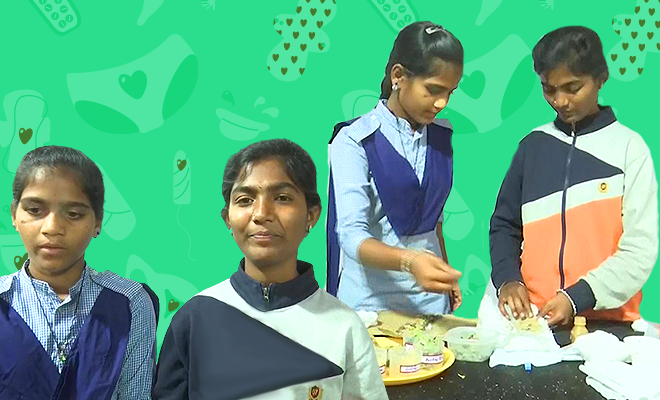Telangana Schoolchildren Create Eco-Friendly Sanitary Napkins Called ‘Stree Raksha Pads’ To Tackle Menstrual Waste. This Is Remarkable!

In India, the topic of menstruation is always hushed and avoided, not only by men but sadly, women too. It’s no shocker then that the lack of open dialogue around it ultimately results in women being clueless not just about menstrual hygiene but the various eco-friendly options available for it. More importantly, the proper way to dispose of sanitary napkins. For example, menstrual cups are way safer, economical and generate less carbon footprint than sanitary pads and tampons. But because most women have little to no awareness about this menstrual product, and tend to stick to the regular non-biodegradable plastic pads. Some are not comfortable using menstrual cups either.
In case you didn’t know, synthetic sanitary napkins contribute to enormous menstrual waste, which is one of India’s most severe but silent problems today that needs to be tackled. This could be done by introducing and acquainting women to more eco-friendly options like organic pads. A bunch of students from Telangana’s government school realised the urgency of the situation and thus came up with a solution to the issue. They created zero waste sanitary napkins named Stree Raksha Pads in an attempt to reduce sanitary waste.
Telangana: Students of a govt school in Yadadri Bhuvanagiri district make ‘zero waste’ sanitary napkins ‘Stree Raksha Pads’. “Pads available in the market don’t decompose easily. To solve this problem, we made this pad that is made of organic materials,” says a student. (04.01) pic.twitter.com/OUrLG3MrAD
— ANI (@ANI) January 4, 2021
The students of Zilla Parishad High School, Mulkalapally in the Yadadri Bhuvanagiri district of Telangana made these 100% organic pads using eco-friendly and natural material like water hyacinth, stocks, basil seeds, neem leaves, cotton, fenugreek, turmeric and sabja seeds. Swathi, a student who worked on the product told ANI, “The Pads available in the market don’t decompose easily. To solve this problem, we made this pad made of organic materials. To find a solution to the prevailing sanitary waste issue, we have come up with an idea and have created sanitary pads from organic materials. The sanitary pads that are currently being used by many are made from petroleum chemicals which have many side effects and take many years to decompose leading to many environmental issues.”
She also added that the entirely compostable pads draw some inspiration from the traditional techniques used by women to make a modern version of the cloth pad. She said, “After researching that water hyacinth has a lot of Ayurvedic essence in it and the way it has been used by many women by warping it in a cloth along with cow dung as sanitary pads during ancient times, we have decided to create more contemporary sanitary pads.”
Amazing innovations presented by young people in #Telangana in the grand finale of the #SchoolInnovationChallenge in Hyderabad today.
?4041 schools and 8750 students took part, with 25 finalists ? pic.twitter.com/Z8e3z29BWn
— UNICEF India (@UNICEFIndia) January 4, 2021
Kalyani, the teacher who mentored the girls said, “The girls who live in village areas cannot afford the contemporary sanitary pads as they are costly, and many still stick to the ancient methods. Moreover, the sanitary pads available in the market may have side effects and sometimes lead to serious complications. Therefore, the students have come up with this idea to create an organic sanitary pad named ‘Stree Raksha Pads.’ I am proud of them.”
Kudos to these students from Telangana for coming up with a remarkable solution to manage sanitary waste. But are we doing our part? According to the studies, 353 million women generate 44,125 million kilos of menstruating waste every month and one pad could take somewhere between 500 to 800 years to decompose. We don’t even realise how much waste we produce every month when we can simply adopt more eco-friendly practices by using organic and zero waste menstrual products like the Stree Raksha Pads.
Plus, they are made of natural materials and organic cotton as opposed to chemicals and environment baddies in the regular ones that not only harms the planet but also cause skin irritation and reactions. So basically, synthetic and plastic pads pose a great threat to the climate as well as contribute to health hazards, in case you needed more reasons to switch to organic feminine hygiene products.

















